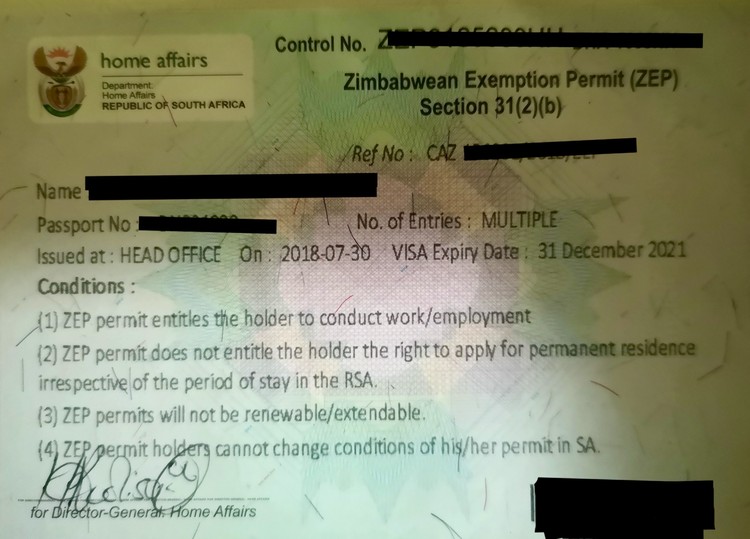SCA dismisses bid to appeal Zim permits ruling
Minister Motsoaledi wanted leave to appeal a ruling that declared the termination of the Zimbabwean permit programme unlawful, unconstitutional and invalid
The Zimbabwean Exemption Permit programme will not end any time soon, following a Supreme Court of Appeal dismissal of the Minister of Home Affairs’ request for leave to appeal. Archive photo: Tariro Washinyira
- The Supreme Court of Appeal has dismissed a bid by the Minister of Home Affairs to appeal a ruling that the termination of the Zimbabwean Exemption Permit programme was unlawful, unconstitutional and invalid.
- The court ruled there were no reasonable prospects of success.
- Last year, the Pretoria High Court ordered Minister Aaron Motsoaledi to reconsider the termination of the programme following a fair, consultative process that complied with the relevant laws.
The Supreme Court of Appeal (SCA) has dismissed with costs an application by Home Affairs Minister Aaron Motsoaledi to appeal a Pretoria High Court judgment declaring the termination of the Zimbabwean Exemption Permit (ZEP) programme to be unlawful, unconstitutional and invalid.
In a ruling handed down earlier this month, the court said the application for special leave to appeal was dismissed on the grounds that there was no reasonable prospect of success.
There was also no other compelling reason why the appeal should be heard.
The Helen Suzman Foundation (HSF), the primary litigant in the matter, says this means the High Court ruling remains valid, unless the matter is referred to the Constitutional Court.
“The ZEP permits are therefore valid and allow holders to continue living in South Africa on the same terms and conditions prior to its unlawful termination,” the HSF said.
In June last year, three judges in the Pretoria High Court directed the minister to reconsider the termination of the ZEP permit programme “following a fair process” that complies with the relevant laws.
Pending the outcome of that process, the judges ruled, the permits would remain valid for another 12 months (until the end of June 2024), and ZEP-holders had protection from arrest and deportation.
The case was brought by the HSF and the Consortium for Refugees and Migrants in South Africa after the minister announced the end of the programme in 2021.
Subsequently he granted further extensions but remained adamant that the 178,000 permit holders must either apply for other visas, if they qualified for them, or return “home”.
In their ruling, Judges Colleen Collis, Gcina Malindi and Mandlenkosi Motha (writing as the court) said the minister had made no attempt to solicit representations from those affected before he took the decision.
The first call for representations had been done “after the fact” and was not a “genuine consultation”.
The invitation was “meaningless”, they wrote and from affidavits before the court, it appeared that there was a “notable disdain for the value of public participation”.
The judges said the minister’s failure to consult, made the decision to terminate the programme unfair and irrational because no attempt had been made to assess the impact on the ZEP holders and their children and the current conditions in Zimbabwe.
In November 2023, the HSF launched an urgent application seeking an “enforcement order” of the June 2023 ruling after the minister, failing to get leave to appeal from the Pretoria court, indicated he was intent on appealing by petition to the SCA. The HSF believed that this meant the judgment would be automatically suspended, which would put ZEP holders at risk of deportation while the appeal process played out.
But the judges dismissed the application saying it was not needed and that their judgment guaranteed the rights of ZEP holders until at least June 2024 in spite of the pending appeal.
Support independent journalism
Donate using Payfast

Don't miss out on the latest news
We respect your privacy, and promise we won't spam you.
Next: Homeowners block entrance to Eskom over blackouts
Previous: Khayelitsha families rebuild shacks after botched relocation
© 2024 GroundUp. This article is licensed under a Creative Commons Attribution-NoDerivatives 4.0 International License.
You may republish this article, so long as you credit the authors and GroundUp, and do not change the text. Please include a link back to the original article.
We put an invisible pixel in the article so that we can count traffic to republishers. All analytics tools are solely on our servers. We do not give our logs to any third party. Logs are deleted after two weeks. We do not use any IP address identifying information except to count regional traffic. We are solely interested in counting hits, not tracking users. If you republish, please do not delete the invisible pixel.

